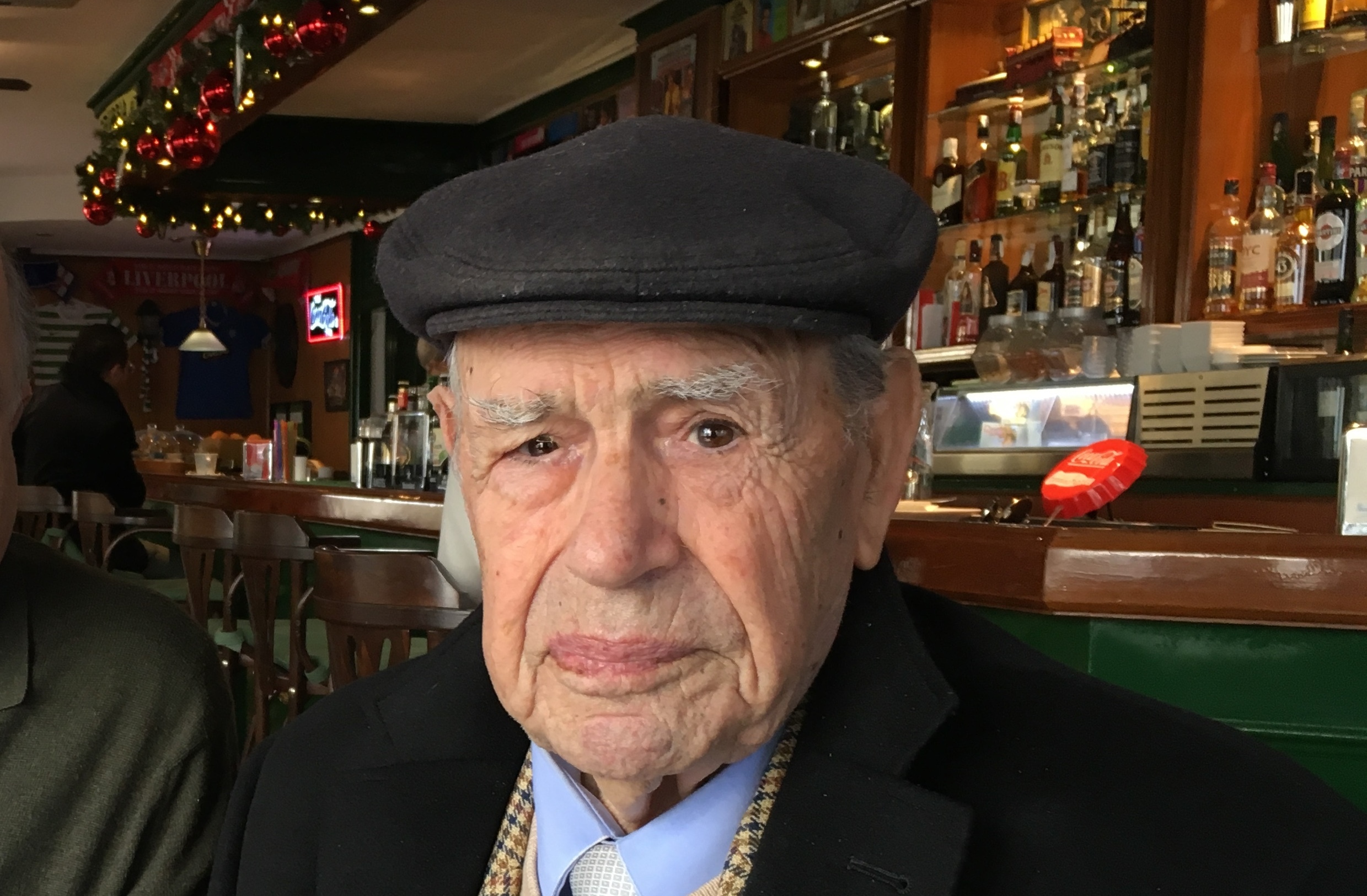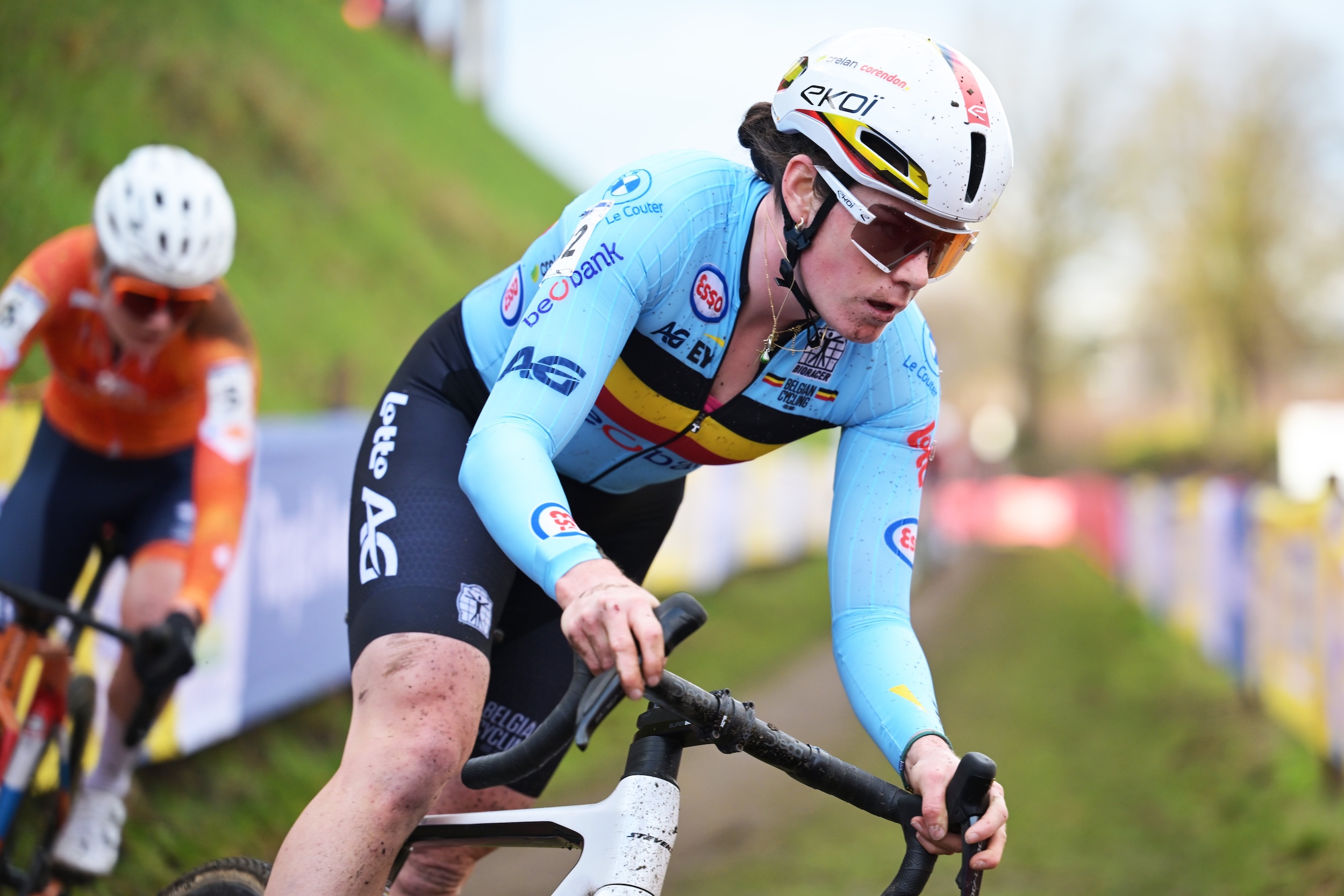Bernardo Ruiz obituary – the international pioneer of Spanish racing
Remembering the first Spanish racer to reach the Tour de France podium and 1948 Vuelta a España winner, who died August 14, 2025 aged 100

For years after he retired, if you ever requested an interview with Spanish cycling pioneer Bernardo Ruiz, who died late last week aged 100 in his hometown of Orihuela, he would always tell you to meet up for morning coffee in the town's venerable former casino.
A tall, solidly built and stately figure with an eagle-like stare, Ruiz would sit bolt upright in a high-sided armchair in one of the 19th-century building's wood-panelled reception rooms, puffing away on one cigarette after another and relating the highlights of his 17-year professional career. Listening to what Ruiz had to say – with the harsh clack of domino tiles from different games on glass coffee tables, played by his equally senior peers, occasionally intruding from the background – always felt like an immense privilege, as by the time he reached his nineties, he'd become one of the very last living links to the 1940s and 1950s professional racing scene.
His tales of racing with Fausto Coppi, Gino Bartali, Hugo Koblet, Jean Robic and their ilk were fascinating enough. But probably what made Ruiz an even more exceptional interviewee was the insights he'd provide into one of its least-known and most inaccessible areas of the sport at that time: what it was like to try to eke out a living as a bike rider in the then-internationally isolated, desperately impoverished and socially backward Spain.
Like everything else in the country, cycling back then was helplessly entangled in the combined effects of a brutal, ultra-conservative military dictatorship – the longest-lasting in western Europe in the twentieth century – and an economic crisis so severe and lengthy the two decades following the 1936-1939 Civil War are still referred to as the 'years of hunger'.
With an international sports boycott in place until the late 1940s as a result of Spain's support of the Axis in World War II, bike racing was an impoverished, emaciated offshoot of the comparatively much wealthier and dynamic post-War version on the other side of the Pyrenees.
But if Ruiz was forged in a racing scene fought out in a country blighted by extreme poverty and hunger and over largely unpaved roads, he nonetheless became Spain's first ever winner of two Tour de France stages in a single year in 1951, its first ever Tour de France podium finisher in 1952 behind Fausto Coppi and Stan Ockers, the first Spanish stage winner in the Giro d'Italia and the first to complete all three Grand Tours in a single year, in 1955.
He was also the country's first UCI-registered professional. Just as Brian Robinson in the 1950s paved the way for much greater continental British success with Tom Simpson, there's a strong case for saying that without Ruiz gaining such a significant foothold in the sport, Spain would have remained an isolated cycling backwater for considerably longer.
The latest race content, interviews, features, reviews and expert buying guides, direct to your inbox!
The number of improbable circumstances and chance events that somehow allowed Ruiz to gain that status as twentieth Spain's key racing pioneer was, simply, mindboggling. His first bike, for example, was only purchased after his parents, small-scale farmers whose left-wing pre-war activism meant they were amongst the vast numbers of Spaniards permanently denied the right to work legally by Franco's regime, needed a quick transport fix for their black market business when the family donkey was killed in a traffic accident.
The bike in question was a French-made Alcyon, bought thanks to the military pension provided by the Franco dictatorship to his brother, press-ganged out of prison to fight on the World War II Russian front, only to be badly injured in a grenade attack. (A family Christmas game, Ruiz once said, used to be counting the pieces of shrapnel that remain permanently embedded in his brother's head as a result.)
As for his first bike race, that came after Ruiz saw a bunch of riders pedalling along together, and turned around and joined them to see what all the fuss was about, only to discover it was a competition.
"To this day, I really don’t know how I became a racer. I must have been 16 or 17, so I started very late," he told Rouleur in an interview in 2020.
"In those days virtually nobody in Spain had bikes. If they did, they were really heavy, old things and often the tyres were simply cords made out of vegetable fibres."
But winning a junior regional championships nonetheless proved Ruiz had talent for bike racing, and with it came the realisation that riding the local events villages and towns put on as entertainment in their annual fiestas offered some kind of escape from the broken, half-starved misery of 1940s rural Spain. However, with no amateur teams, no fixed wages, no racing licences and very limited public transport, bike racing remained an incredibly chancy affair.
"You'd save money on train fares by riding 700 or 800 kilometres from Barcelona to Bilbao in long lines of a dozen riders or so, praying you wouldn't get stopped by the police and fined for riding in a group," Ruiz once said. "Then either you won, or you didn't eat."
A breakthrough professional victory came when aged 20, he outwitted the top favourites in the 1945 Volta a Catalunya - at the time, a far more important race than the Vuelta a España. Victory in the 1948 Vuelta itself followed, but Ruiz' later description of the race as "terrifying" made it clear that simply surviving was the main objective.
In a peloton of 50 or 60 riders, he once said, roads were so bad that they would deliberately race as far apart from each other to avoid crashing, and food so scant riders would smuggle bread into their sleeping quarters in case it was confiscated (and eaten) by the equally famished race officials. Police protection limited to just two officers for the entire race, one of whom was, Ruiz recalled, "permanently drunk so he didn't count."
Ruiz was equally unimpressed by the risibly small amount of money he got as the winner– 30,000 pesetas – a tiny percentage of what he could have made abroad for a similar victory. Small wonder that rather than bother sticking around for the final prize-giving ceremony in Madrid by dictator General Franco in person, Ruiz simply opted to leave early and avoid it altogether – fortunately, without subsequent reprisals.
He was present, however, for Spain's first ever fielding of a national squad in the Tour de France in 1949, once the post-war boycott had lifted, but it was hardly a success. Rather, it ended with the entire team abandoning after five stages so they could race the Tour of Portugal, which had better start money. (Ruiz recollects Dalmacio Langarica, later a top director, sitting on the side of the road deliberately destroying his bike wheels so he could claim he'd punctured, with teammates in the broom wagon chanting "Quit, quit" as they drove past.)
But, in 1951, after a year where the Spanish were banned from the Tour following their mass abandon, Ruiz managed to take two stage wins in a single edition. He then became, alongside Algerian Abdel-Kalder Zaaf (famous for falling asleep under a tree in the 1950 Tour and then riding the race the wrong way) a big hit on the post-Tour criterium circuit, riding no fewer than 57 in a single summer.
One of Ruiz's key secret weapons was taking care of equipment, hanging tyres up for months in his garden shed, "like Spanish hams", as he put it, to ensure they were tougher. He managed to do three or four Tours and four or five Giros without puncturing, he said, "because you could do 60,000 kilometres if they were properly treated, more than half than if they weren't."
He also was a top bike handler, crashing only twice in his career – once into Fausto Coppi at a criterium in Perpignan, breaking Coppi's collarbone, and once when he was metres away from winning the '45 Volta and collided with a dog. "But the official made me go back and pick up my bike to cross the final line," he'd recall.
By 1952, with so much success, Ruiz's days of poverty were definitely behind him and he'd later claim he had become Spanish sport's first millionaire, buying up property in his native Orihuela. But he continued racing, too, clinching third place overall behind Fausto Coppi at the height of his powers in the 1952 Tour – "we were racing to see who finished second" he once said – and establishing a new record for finishing consecutive Grand Tours: 12. This stood until Adam Hansen reached 13 in the 2015 Vuelta a España, with Ruiz meeting the Australian that year at the race at a start in Orihuela.
Hansen y Bernardo RuizVencedor de LV 1948 con 12 Gran Tours consecutivos, 54-58.Hansen batió su récord.#LV2017 pic.twitter.com/m23KZnrg3cAugust 27, 2017
Yet for all he had taken Spanish cycling to hitherto unseen heights in the Grand Tours and put the country on the map internationally, Ruiz was getting increasingly overshadowed, too, by his arch-rival Federico Martin Bahamontes, both on and off the bike. Erratic, but charismatic, Bahamontes' exceptional climbing skills made Ruiz's less showy talent as an allrounder look mundane to the broader public, and the Eagle of Toledo's utter unpredictability sparked much greater fascination, too.
Ruiz and Bahamontes did not get along personally, either. Bahamontes wrongly accused Ruiz of making him crash on a descent in the Vuelta a Asturias and, rightly, saw Ruiz as a ringleader in the collective bid to ensure Bahamontes lost the 1957 Vuelta, which ended with riders holding on to Bahamontes' bike and shorts to ensure he could not chase down the overall winner, Jesus Loroño.
Their enmity endured for years afterwards, with Ruiz, who retired in 1959 to become Bahamontes' sports director, powerless to stop the new enfant terrible of Spanish cycling all but wrecking the 1960 Vuelta with a go-slow protest. "What could I do, kill him?" Ruiz once said, in a mark of desperation.
However, his love of bike racing endured long after he hung up his wheels, when he opened a bike shop, briefly worked with Spanish TV as a race commentator on the Vuelta and became a successful businessman in Orihuela. Yet for all his crucial role in Spanish cycling, Ruiz never thought of himself as a pioneer for the sport at the time.
"Bollocks to that," he once said in an interview for Procycling magazine. "I raced to earn my living. But in Spain I was the one, I think, who opened the door for all the others."
Bernardo Ruiz, rider, sports director and race commentator (born, Orihuela, Spain, January 8 1925, died, Orihuela, Spain, August 14 2025).
Alasdair Fotheringham has been reporting on cycling since 1991. He has covered every Tour de France since 1992 bar one, as well as numerous other bike races of all shapes and sizes, ranging from the Olympic Games in 2008 to the now sadly defunct Subida a Urkiola hill climb in Spain. As well as working for Cyclingnews, he has also written for The Independent, The Guardian, ProCycling, The Express and Reuters.
You must confirm your public display name before commenting
Please logout and then login again, you will then be prompted to enter your display name.

